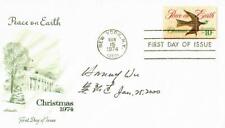"Laogai Research Foundation" Harry Wu Signed FDC Dated 1974 For Sale

When you click on links to various merchants on this site and make a purchase, this can result in this site earning a commission. Affiliate programs and affiliations include, but are not limited to, the eBay Partner Network.
"Laogai Research Foundation" Harry Wu Signed FDC Dated 1974:
$129.99
Up for sale the "Laogai Research Foundation" Harry Wu Signed First Day Cover Dated 1974.
February 8, 1937 – April 26, 2016) was a Chinese-American human rights activist. Wu
spent 19 years in Chinese labor camps, and he became a resident and citizen of
the United States. In 1992, he founded the Laogai Research Foundation.
Wu was born into an affluent family in Shanghai; his father was a banking official and his mother had
descended from a family of well-to-do landlords. Wu studied at the Geology
Institute in Beijing, where he earned a degree. In 1956, the Communist Party began
a campaign encouraging citizens, particularly students and intellectuals, to
express their true views of the Party and the state of society (known as
the Hundred Flowers Campaign).
Although cautious, Wu eventually voiced some sentiments, by disagreeing with
the Soviet Union's armed
crackdown in Hungary, and the practice of labeling people into
different categories. By
the Fall of 1956, China's leader, Mao Zedong abruptly reversed course and
proclaimed that the true enemies of the Party had been exposed and 19-year-old
Wu was subsequently singled out at his university. Wu later wrote of this
experience: "This was the first time I had ever been singled out as a
political troublemaker. Most of my classmates were more pragmatic than I, and
they just repeated what the Communists wanted to hear." For the next few
years, Wu was continuously criticized in Party meetings and closely monitored
until his arrest in 1960 at the age of 23 when he was charged with being a
"counterrevolutionary rightist",
and was sent to the laogai (China's system of
forced-labor prison camps). Harry Wu was imprisoned for 19 years in 12 different camps mining coal, building
roads, clearing land, and planting and harvesting crops. According to his own
accounts, he was beaten, tortured and nearly starved to death, and witnessed
the deaths of many other prisoners from brutality, starvation, and suicide. In
the camps Wu met a rough, illiterate peasant with the nickname, "Big Mouth
Xing". Wu wrote, "I could see how Big Mouth Xing had gotten his name.
The corners of his mouth seemed to stretch all the way to his ears."[4] Xing had experienced a lot of starvation in
life, first in his rural village, and later in the camps, and had become
obsessed with getting enough food. Lean and muscular, with missing teeth and
ears that "looked black with dirt", Xing taught Wu how to fight for survival in the
camps. He showed Wu how to dig for underground rat burrows in order to find
clean caches of grain and beans which could then later be boiled for food to
avoid starvation. He also taught Wu how to be aggressive to
discourage bullies. Wu came from an urban, educated background and was naive.
Xing often repeated to Wu, "Nobody here will take care of you. You have to
take care of yourself." Wu later wrote: I was twenty-three, a college
graduate raised in an affluent, urban family, and a political criminal. Xing
Jingping, three years younger than I, was a peasant from a starving village, a
thief with no education and no political viewpoint. The gulf between us was
vast, yet I grew to admire him as the most capable and influential teacher of
my life. Wu
was released from his life sentence in 1979 at the age of 42, as a result of
political changes following the death of Mao Zedong. He obtained a teaching position at the Geoscience
University in Beijing, but found that the label of having been a political prisoner continued
to follow him. Wu also found that those who had played a part in labeling
him "an enemy of the people", leading to his imprisonment twenty
years earlier, tended to react to his survival and return the same way:
"All that has happened is in the past ... the Party has suffered
too."
Wu left China for the United States in 1985, after having received a
chance invitation from the University
of California at Berkeley to be a visiting scholar. (A faculty
member at Berkeley had read an article that Wu had written in an academic
journal on geology).

Related Items:
"Laogai Research Foundation" Harry Wu Signed Book Page
$69.99
"Laogai Research Foundation" Harry Wu Hand Signed FDC Dated 1974
$90.99


